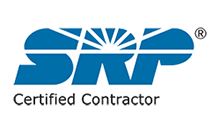Why is there ice on my outdoor condenser?
Ice on your outdoor condenser heat pump should only happen in the winter and is the result of your heat pump system inability to go into defrost and melt the ice you are observing. This occurrence will cause your heat pump to lose its ability to heat your home and or heat your home efficiently. If you observe this happening to your system, contact your local, trusted HVAC service provider for further assistance.
Why is there steam coming from my condenser?
During cold weather, your heat pump HVAC system may be going through what is known as a defrost cycle. This causes HOT refrigerant gas to flow through your condenser unit melting any ice that may have formed and the result is steam rising from your outdoor unit.
Why does my heat pump blow cold air in the winter?
Answer: During cold weather (55 degrees or below) your heat pump system’s coils may drop below freezing due to cold refrigerant trying to absorb outside heat. With the humidity outside, this will cause ice to form on the outdoor coils. Your heat pump is designed to automatically identify and resolve these occurrences by initiating the “defrost cycle”. This process causes your system to gather indoor heat and send it back to the outdoor coils to melt the ice during which time you will experience cold air blowing into your home (essentially turning your heat pump back into an air conditioner). At times this may take up to 15 minutes. If it takes any longer it may be a good idea to contact your HVAC provider to ensure proper operations.
What does DEFROST mean?
The “Defrost Cycle” is the time during which your heat pumps is trying to remove the ice that has formed on the outdoor condenser coil. During cold weather (55 degrees or below) your heat pump HVAC system’s coils may drop below freezing due to cold refrigerant trying to absorb outdoor heat. With the humidity outside, this will cause ice to form on the outdoor coils. Your heat pump is designed to automatically identify and resolve these occurrences by initiating the “defrost cycle”. This process causes your system to gather indoor heat and send it back to the outdoor coils to melt the ice during which time you will experience cold air blowing into your home (essentially turning your system into an air conditioner). At times this may take up to 15 minutes. If it takes any longer it may be a good idea to contact your HVAC provider to ensure proper operations.
Why is my bedroom hotter or colder than the rest of my home?
Many factors may cause rooms in your home to become hotter and/or colder than others. One of the simplest occurrences we notice is dirty or restrictive air filters. If your home was good before and the symptoms have been slowly increasing, this should be your first step in resolving such issues. Another possibility is that your system may have mechanical issues. This could be refrigerant related or a mechanical issue. In the Phoenix market, where we are from, we see undersized or improperly installed ductwork. This affects the airflow to the rooms and can cause the hot/cold rooms. Externally, the position of the sun in conjunction with the time of day affects many of our homeowners.
Having a qualified professional check the equipment operation and the ductwork to ensure proper sizing and installation is the first step. Finally, balancing the ductwork and assigning a design airflow cfm to each room is necessary. This should have been completed during design and construction of the home, but there are many external items that can change the “load” (upgraded windows, shade trees, upgraded insulation). All can have an effect on indoor comfort and hot/cold rooms.
Why is my A/C so LOUD?
If the noise you are experiencing is new, then please turn off your air conditioning system and contact your nearest HVAC professional. Depending on the manufacturer and the quality of the system, the noise your air conditioning system may produce can vary greatly. On top of that, the quality of the installation techniques can also be a contributing factor. Noisy air conditioning systems may be normal or could be signs of refrigerant or mechanical issues. Leave it to your trusted HVAC professional to give you proper peace of mind.
Why are my electric bills so high?
Lets face it, Air Conditioners use a lot of electricity. Any loss of efficiency will cause your bills to soar. Dirty air filters, duct leakage, mechanical parts starting to fail, overamping, improper refrigerant levels, lack of maintenance, outdated/inefficient systems and poor installation techniques can all be contributing factors to high utility bills.
Should I leave my house at one constant temperature?
Given all the new innovations with air conditioning systems these days this question pops up again and again. Is there a good answer? NO. All homes have their own “personalities”, so to speak, depending on the type of construction, the temperatures we are trying to achieve, our living habits, how many people we have in our home, how old our system is, what kind of system do we have, is it properly maintained, what kind of climate, what season is it, etc; all play a contributing factor in this question. Asking your local HVAC professional may give you some answers to these questions.
But from an expert: Try setting the temp back some and see how the home recovers. Example: You work all day and don’t want to cool your house to 75 degrees while you’re at work. Set the thermostat to 80, then when you get home set it to the desired temperature and see how your house recovers. It’s going to take a few hours to achieve the desired set temperature, but remember this: The most efficient air conditioner is one that never runs. The second most efficient air conditioner is one that never turns off. The starting and stopping of your air conditioner is what uses the majority of the electricity and drives up operating costs. However, do not turn off the system when you leave the house and then turn it on when you come home. The air conditioner will never recover and the home will always be uncomfortable.
You can also contact your local utility company to see if they offer any time of use plans that can save you money.
Should I hire a company to perform maintenance on my AC?
Absolutely, positively, YES!!!! HVAC professionals are trained to discover potential future or current breakdowns. Depending on the make and model of systems, many experience the same common failures. Your HVAC professional should be able to confidently identify these issues if any exist. Simple preventative measure like changing air filters or cleaning debris out of our condenser so rodents don’t make it their home are some of the things that are addressed. Hiring a trained technician is not overly expensive and needs to be done at the start of every season. But remember, your system is a mechanical device and they do break down even though you performed maintenance. That is reason to believe it is a waste of money or a bad idea to do maintenance. The majority of the time, finding small problems during maintenance does preclude future expensive and inconvenient break downs.
How often should I change my AC filters?
Another common question in the HVAC industry is “how often should I be changing my air filter?”. The right answer is, “it depends”. So let’s try to help with this question. First thing to consider is where do you live? In the desert where I am from, we need to change our filters much more often than people in the Midwest. Our dusty environment causes filters to appear clean but may be completely plugged especially when using 3M ultra-allergen filters (very restrictive). Next question is, ”How big is the home?” The bigger the home the bigger the HVAC system it requires. The bigger the HVAC system, the more air it has to move. The more air you move the more air requires filtration.
Should I get my ducts cleaned?
If you don’t know what is in your ductwork it is always best to just go ahead and have them cleaned? The most important part to having your ducts cleaned is to have them cleaned by a licensed professional with good reviews and years of experience in the industry. In the Phoenix market, we use a lot of flexible ductwork. In my opinion I would rather replace the ductwork than clean it, simply because the inner liner of our ductwork is like a plastic bag that can tear and expose the insulation behind. This worries me because what is worse?? Breathing in dirt or breathing in insulation? A reputable duct cleaning company should run a camera through your ductwork first, so you can see how dirty it is and what they are removing.
How often should I have my heat pump serviced?
Per most manufacturer’s recommendations, it should be done once a year per system. By this statement, this would mean once a year for heat pumps since they are considered one system. This simple truth though is twice a year. It is very important to ensure proper operations between seasons. Also in the dead heat of summer a technician can only really check the cooling portion, and in the midst of winter he can only really check the heating portion. Most systems do not allow us to properly check refrigerant charge without pulling all the refrigerant out and weighing it back in, which is simply ridiculous. So long story short…have your heat pump maintained twice a year to ensure proper operations and eliminate confusion.
Why is my thermostat blank?
A blank thermostat means only one thing…. No power. So with that being said there are two ways thermostats get their power: Batteries located inside the thermostat or from the air conditioning system itself. The easiest way to figure out if your thermostat has batteries in my opinion is to Google it. If it does not have batteries the next best thing to do is check that the breakers are all on. If the breakers are on, your thermostat doesn’t take batteries, and it’s still blank, contact your local HVAC professional to further diagnose what may have happened.
Why is there water dripping off the roof of my house?
During the winter months with a heat pump located on your roof, you may notice water dripping off your roof but clear skies outside. This is due to the system going through its defrost cycle and melting the ice that formed on the outdoor coils. Unlike the condensate that forms on the indoor coil during the summer months, there is no pan to catch the excess water from the defrost cycle. Therefore the water drips off your roof.
During the summer months, your a/c unit produces condensation. If you see water dripping off your roof, it could be that your condensation line is broken and draining onto your roof. It’s a good idea to have it checked out by your trusted HVAC Professional
Why is there a dirty sock odor coming from my vents?
This question is one of the most common concerns of our homeowners today in Arizona. In our industry, this is known as Dirty Sock Syndrome. In most cases, this is a non-toxic condition and your local HVAC provider should assess it either way. Through research it has been discovered that the porous recycled aluminum, steel and copper cause dirt and dust to accumulate on the coils and possibly a bacteria to grow on the surface. This is a more common occurrence seen in humid climates. At first we were told this odor was due to using recycled aluminum and it may still, but lately it seems companies use this to upsell or use scare tactics. With the talk of bacteria and the very scary “M” word (mold), we cannot overlook this condition and assume all is ok. Proper assessments must be made and recommended repairs must be fulfilled to guarantee a safe environment. Another common occurrence our technicians have noticed is drain pans that aren’t properly pitched causing water to stagnate in the pan; and in the hot Arizona heat, marinating a really neat odor. So please if you have noticed an odor contact your nearest trusted HVAC provider for a proper diagnosis.
Why is there a big rust stain on the side of my house?
Answer: Contact your trusted HVAC provider as soon as possible. What you are seeing is water dripping from the secondary line because the main drain on you air conditioner is plugged. Water overflows the primary drain and enters the secondary drain pan. The secondary drain is supposed to drain in a conspicuous place, usually up high above a window or door. The secondary drain pan is made out of galvanized steel which rusts over time. So seeing a rust stain on the side of your house usually indicates a more serious situation. Once this pan rusts through, the water will drip onto your ceiling and can cause major interior damage. Scary! So, don’t hesitate on this repair.
Why is it so noisy when my AC comes on?
This is a common question homeowners ask us all the time. When an air condition first starts up, there is a lot happening at the same time. First off, you are starting a big electric motor (compressor) under load. It takes a lot of electricity to start this motor. Also, there is not much oil running through this compressor at start up, which causes more noise until shortly after start-up. Additionally, this compressor’s job is to take vapor refrigerant and compress it to a liquid. But the system has been off and the refrigerant may have migrated around resulting in little droplets of refrigerant to be on the vapor side causing even more noise. Lastly that compressor has design pressures during running operation that allows it to run smoothly, so until it has a chance to run a bit you can expect louder than normal compressor noise. Installing a Compressor Start Kit will help reduce some of this start up noise. If you suspect the noise is not normal contact your trusted HVAC service provider for further diagnosis.
Why does my Air Conditioner run all the time?
There are a few conditions that may cause your air conditioner to run continuously. During the hot Arizona Summer we receive this question quite often. During our monsoon season on a humid 115 degree day, air conditioners will run continuously to try to maintain what most consider a “comfortable” indoor temperature (74-80 degrees).
Some systems are also 2-stage or variable stage, which mean they are designed to run longer in a lower stage to properly condition the air in the home without running at 100% as an energy saving measure. This will cause longer run times, but will use less electricity to achieve optimal comfort.
Newer digital thermostats are also designed to try to lengthen the air conditioner’s run time. This is done to better condition the indoor environment, so your air conditioner doesn’t start and stop continuously.
If you notice your air conditioner running continuously and the thermostat never getting down to set temp, if it isn’t 120 degrees outside you may have a mechanical or refrigerant problem. Your trusted HVAC professional should be called to check the operation of the equipment.
Will running ceiling fans in the summer help cool my home?
When we think of a fan, we think “cooler air”, right?? WRONG! The truth is that ceiling fans, or any fan for that matter, cool your body down by means of “evaporation”. The air flowing across your body makes you feel cooler, but it isn’t actually lowering the temperature in the home. Using a fan in the summertime is a good way to “feel” cooler, even without reducing the temperature on the thermostat. In fact, you could actually set the thermostat a little bit higher, and still feel comfortable, thus saving you money. But remember, fans don’t do anything to make the room feel cooler, so if you aren’t in the room shut the fan off.
Why is my heater blowing cold air?
If your heater is blowing cool air but maintaining the indoor temperature, chances are your thermostat fan switch is set to “on”, meaning your heater will circulate air even if it isn’t heating. To eliminate this, simply switch the fan setting on the thermostat to “auto”.
If your gas furnace is on, meaning heating the home, the fan switch on the thermostat is set to “auto” and it is still blowing cool air, chances are there is a mechanical issue that needs to be addressed. Contact your trusted HVAC Professional to have them check out the system.
If you have a heat pump system (all electric) and it is in heating mode and the thermostat is set to “auto”, there is a good chance that the system has gone into “defrost” mode. This normally happens when the outdoor temperature is below 55 degrees and the outdoor coil is developing frost and requires it to defrost. This should last no more than 15 minutes, during which time you will feel cold air blowing from the vents. If it lasts longer than 15 minutes, there may be an issue that requires service by your trusted HVAC Professional.
How to identify what kind of AC system I have?
Many of our customers here in Arizona have a very difficult time trying to figure out what kind of AC system they have. Arizona is a big heat pump market, but there are also many homes that utilize gas for heating. One of the easiest ways to figure out what type of system you have is by your utility bills. If you receive a gas bill, chances are you have a gas furnace. If you do not receive a gas bill, and your water heater and stove are electric, you most likely you have an electric furnace, or heat pump system. The most simple way to figure this out is to contact your trusted HVAC Professional to maintain your system, and ask them what type of system you have.
I see a water stain on my ceiling; what should I do?
First off, determine where your HVAC air handler and water lines are located. Basically, what else is above your ceiling besides the roof. If your HVAC air handling unit is located in your attic, as is prevalent In Phoenix, you may want to get your trusted HVAC Professional out there to take a look. Especially if it hasn’t rained in awhile. If you recently had a rain storm, and your equipment is in the attic, you may want to start with a roofer to rule that our first.
If the stain is wet, make it a priority as that is a sign of an active leak. If you just notice the stain, and it is dry, it could be an old stain that was never noticed. Either way, have your trusted HVAC Professional out to see what is causing the stain to appear.
How do I air condition my garage or Arizona Room?
Air conditioning a garage is completely different than air conditioning an Arizona room, but the solution may be the same. Garages cannot be connected to the home air conditioning unit due to fire and building code issues. Arizona rooms may be connected to the home’s main air conditioning system but will never perform up to the homeowner’s wants, needs or expectations. So, the question remains: “How do I air condition these two spaces?” The best solution is to install a ductless mini-split air conditioning system. These systems are widely used throughout the world and have been in our industry for a long time. They have the ability to cool these spaces to your desired temperature with reliability and efficiency.
What do I do if there is heat coming out of my vents in the summer?
In Phoenix, our summer months can be more than brutal. With temperatures reaching 120 degrees Fahrenheit, the thought of your air conditioning system failing can cause severe anxiety. If you’re feeling warm air blow out of your vents while the a/c is running, there could be several things causing this.
First, there is a thermostat setting that allow your fan to run up to 90 seconds after the thermostat has satisfied. This is to allow the air to absorb any bit of cooling from the indoor coil and blow it through the home without the compressor running. This is an efficiency measure, meant to save money. If it is uncomfortable, it’s a setting that can be turned off.
Second, if the thermostat is satisfied, and the home is the desired temperature, but warm air is blowing out of the vents, it could be just the fan switch on the thermostat set to “on”, causing the fan to blow continuously. This can be remedied by switching that over to “auto”.
Third, if your a/c system is running, and you feel warm air blowing out of the vents, you may have a problem. It sounds as if something with the outdoor condenser is not functioning, or you may have lost refrigerant. Either way, shut the system off and contact your trusted HVAC Professional immediately to have them take a look at the system.
This air conditioner FAQs page is designed specifically for residents of Mesa, Arizona, seeking reliable and efficient air conditioning solutions. Whether you are looking to install a new Elite Series system, need maintenance tips, or have questions about your current air conditioner, we’ve got you covered. Our FAQ page addresses common concerns, offers expert advice, and provides practical information to help you enjoy a cooler, more comfortable home.
Air Conditioner FAQs Sections:
Choosing the Right Air Conditioner
- Learn how to select the perfect air conditioning unit for your home based on size, efficiency, and the unique climate needs of East Valley, Arizona. With options ranging from a ductless mini split air conditioner for one room to a Dave Lennox Signature system to keep your entire home comfortable, we have your situation covered.
Installation Questions
- Get insights on what to expect during the ac replacement process, including timelines, preparation tips, and how to choose a qualified HVAC technician.
Maintenance and Care
- Discover the best practices for maintaining your air conditioner, including regular upkeep, cleaning guides, and troubleshooting minor issues.
Energy Efficiency Tips
- Find out how to optimize your air conditioner’s efficiency to save on energy bills and reduce your environmental footprint.
Repair or Replace?
- Understand the signs that indicate whether you should repair your existing unit or consider replacing it with a newer, more efficient ductless mini-split system.
Cost and Financing Options
- Explore various cost considerations and financing options available for air conditioning services in the East Valley area.
Warranty and Service Agreements
- Learn about the warranties provided and the benefits of opting for ongoing service agreements to keep your system in top shape.
Seasonal and Weather Considerations
- Tips on how to protect and optimize your air conditioner performance during the extreme heat typical of East Valley summers.
Conclusion: Our air conditioner FAQs page is tailored to answer all your queries about air conditioning in East Valley, Arizona. With the right knowledge and support, you can ensure your home remains a sanctuary of cool and comfort throughout the year. For any further questions, our team of experts is just a phone call or email away, ready to provide personalized advice and professional service.











